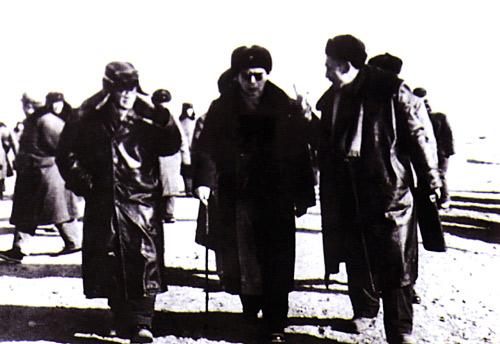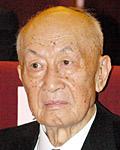(From Beijing Review, 2011-03-13)
Zhu Guangya, a renowned nuclear physicist, died in Beijing on February 26 at the age of 87. Zhu was an academician at the Chinese Academy of Sciences (CAS) and the Chinese Academy of Engineering. He contributed to the development of China's first atomic and hydrogen bombs in the 1960s, and participated in nearly all related research and development programs. Zhu was born in Yichang, central China's Hubei Province, in 1924 and later moved to Wuhan, capital city of the province, with his family. Zhu developed an interest in physics in high school. He studied at National Central University in Chongqing in 1941-42 and then was recommended to the Department of Physics at Southwest Associated University (SAU) in Kunming, southwest China's Yunnan Province, the best university of China during the 1930s to 1940s. Zhu studied nuclear physics at the University of Michigan in the United States in 1946-50, where he obtained a doctorate. Zhu urged overseas Chinese students to return to their motherland after the founding of the People's Republic of China in 1949. He drafted an open letter calling all Chinese students in the United States to go back to China to work, which resonated with Chinese students and scholars. In February 1950, Zhu returned to China. Zhu taught at the Department of Physics at Peking University from 1950-52. As former Peking University president Chen Jia'er recalled, Zhu was the youngest professor in the department. During the Korean War (1950-53), Zhu served as an interpreter in 1952-53. Then he taught at the People's University of Northeast China (now Jilin University) in Changchun in 1953-55. In 1955, China decided to develop the atomic bomb. Zhu returned to Peking University to become the deputy director of the physics research office which was responsible for cultivating talent to develop the technology needed to build the bomb. During the next 15 years, he studied reactor physics and also worked in the Second Ministry of the Machine Building Industry of China. In the fall of 1958, a nuclear reactor and accelerator built with assistance from the former Soviet Union was formally handed over, signaling the birth of the first comprehensive research base for the atomic bomb in China. In 1959, after a dispute, the former Soviet Union withdrew their experts, halting efforts to develop the technology. But China did not abandon plans to build the bomb. In 1959, Zhu, who was 35, became deputy director of the Nuclear Weapons Research Institution in the Second Ministry of the Machine Building Industry, which proved to be a major help for him to develop the atomic and hydrogen bombs. In 1962, the ministry planned to build the first bomb by 1964 or 1965. Zhu wrote two guiding documents for the plan, which the Central Government used to make a decision about the atom bomb. China set off its first atomic bomb on October 16, 1964. Zhu also made a great contribution to the development of China's hydrogen bomb. From 1970 to 1982, Zhu worked on projects for the People's Liberation Army of China and became deputy director of the Commission of Science, Technology and Industry for National Defense, now the State Administration for Science, Technology and Industry for National Defence under the Ministry of Industry and Information Technology of China. As a senior academician at the CAS and the first president of the Chinese Academy of Engineering, Zhu also served on numerous civil technology commissions. He also participated in the construction of the Qinshan Nuclear Power Plant, the first one on the mainland, and the research on the application and development of the radioactive isotope, and the drafting and implementation of China's high technology research and development programs. In September 1999, Zhu was awarded a prestigious medal in recognition of his contribution to China's "Two Bombs, One Satellite" (atomic bomb, hydrogen bomb and man-made satellite) projects. "You have devoted your whole life to the development of the country and service to the people. Your loyalty and unselfish dedication to the country and people will encourage younger generations and their descendants forever," Chinese Premier Wen Jiabao said when he paid a visit to Zhu's home on August 6, 2009. Because of Zhu's prominent contributions, an asteroid, discovered by the National Astronomical Observatories of CAS, was named after him in December 2004. Zhu also served as vice chairman of the National Committee of the Chinese People's Political Consultative Conference, China's top political advisory body, between 1994 and 2003. Zhu always kept a low profile, wrote Nobel laureate Tsung-Dao Lee in a memoir, saying, "Zhu is a real scientist, a scientist with a strategic vision." |
Related News
Photos
More>>trade
market
- Opening of the DICP Symposium on Fuel Cells
- DICP Symposium(XV) on Calorimetry and Thermal Analysis Convoked
- Convening of the DICP Symposium(XVIII) on Early ADME/TOX and DMPK Studies
- International Calorimetry and Thermal Analysis Symposium Opened in Dalian
- 23rd International Symposium on Molecular Beam(ISMB) Opened in Dalian







